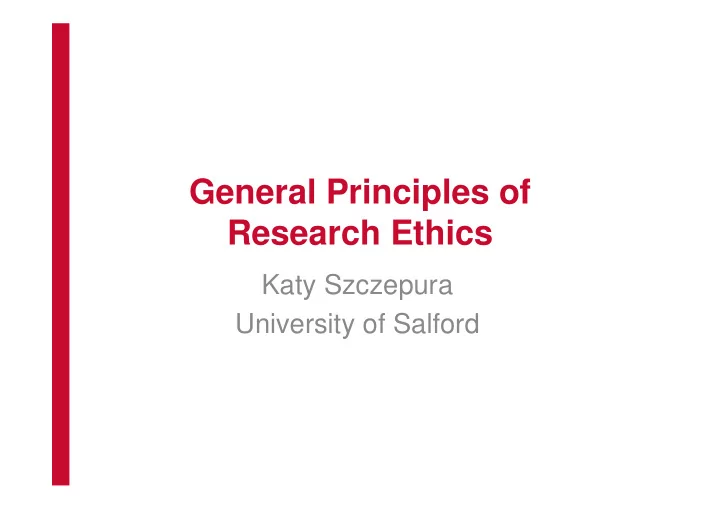

General Principles of Research Ethics Katy Szczepura University of Salford
Why do we need ethical approval? • Recognition of basic rights – Nuremburg Code (1947) – Declaration of Geneva (1948) – Declaration of Helsinki (1975) • Research Governance Framework – Sets out principles, requirements and standards – Defines mechanisms to deliver them – Describes monitoring and assessment arrangements
Health Research Authority • “... protect the rights, safety, dignity and well- being of research participants, whilst facilitating and promoting ethical research.” • Independent review to ensure research meets the required ethical standards
Ethical considerations… The research subject’s welfare Vulnerable groups Equitable distribution of benefits and burdens Informed consent Confidentiality and privacy Protect researchers Ensure quality for dissemination
Does the project need to gain ethical approval? • If the work is to be carried out within the NHS • Speak to the local NHS R&D department – Research – Service Evaluation – Clinical Audit • Do this as early on as possible once the research question has been defined… • HRA decision tool • http://www.hra-decisiontools.org.uk/research/
General definition of research • Intent – Derive generalisable, new , knowledge • Audit and service evaluation measure standards of care • Treatment/service – New interventions are considered research • Randomisation – If there is any form of randomisation of participants it is research
Student research • undergo the same review process as other research projects • reviewers recognise that student research has an educational and training value • proposals will not necessarily be of the same scientific importance or quality as those submitted by professional researchers • the scientific review of an academic supervisor is deemed to be adequate
What to do next… • Define the roles – Sponsor • This is the individual, company, institution, or organisation that takes on responsibility for initiation, management and financing (or arranging the financing) of the research – Chief Investigator (CI) • This is the individual who is responsible for the conduct of the whole project in the UK (the academic supervisor) – Principal Investigator (PI) • The Principal Investigator is the person responsible individually, or as the leader of researchers at a particular site, for the conduct of a study (the student)
What to do next… • The students need to create an account and start looking at the form… – The best chance to communicate with the committee – Is exhaustive – May contain things seemingly not ethically relevant – May contain things seemingly not relevant • However – Is not optional – Is the first thing the committee will know about the project
What is important? • When filling in the ethics form it is important to always consider the research from the participants perspective • What do committees look at? – What’s happening to the patient? – Do they know what’s going to happen? • Informed consent – understandable information – Is what’s happening justified? • Risk vs. Benefit/Discomfort vs. Benefit – Is there a scientific basis for the study? • Repeating existing work? • Poor research is unethical – Coercion and Inducement – Confidentiality and Dignity – Dissemination
Filter Page • The choices made will affect the form that needs to be completed
General tips • Make sure lay language is used throughout – Flow diagrams? Pictorial summary? • Be honest about the ethical issues • What is it the participant will need to consent to? • Keep primary objectives simple, modest expectations are not unethical! • Scientific justification needs to be straightforward – not copied from a protocol! • Consider risk and benefit – Researcher risk… • Dissemination – Reporting back to communities or the cohort? – What will happen to the dissertation? • Ask for advice R&D or Ethics Committee
Consent and Information sheets • There are standard formats and online guidance • http://www.hra-decisiontools.org.uk/consent/ • Information sheet: – The form is a useful starting point – Can delete anything irrelevant – Standard wording for indemnity, ethics approval etc – Be explicit in quantifying any risks or discomforts • Give lay examples for radiation doses or blood volumes – Help the participants (and committee) understand the project, use pictures, photographs etc • Use lay language
Summary • Decide whether the projects needs ethical approval – With agreement from local R&D department • Define the roles – dependant on University policies – later today • Student needs to create an HRA account and engage with the forms • Complete the forms using lay language • Consent form • Participant information sheet • Wait for the review! – CI should attend the committee meeting to support the student
Recommend
More recommend